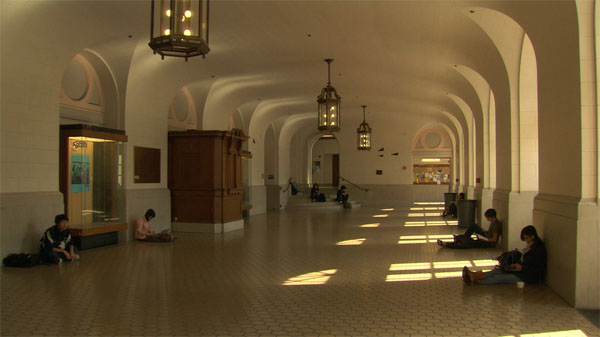“It has taken Frederick Wiseman 45 years to get from high school to college,” writes Nicolas Rapold at the top of his profile for the New York Times. “The master filmmaker’s latest portrait of an institution, At Berkeley, centers on the University of California in Berkeley and joins an extraordinary résumé that stretches back to High School in 1968 and his controversial debut, Titicut Follies, in 1967. In between, Mr. Wiseman has established himself as one of America’s greatest chroniclers in any medium. ‘What I’m interested in is making movies about as many different subjects as I can, and as many different forms of human experience,’ Mr. Wiseman, indefatigable at 83, said in a phone conversation during his summer break in Maine.”
“A monumental, 244-minute exploration of the famous California university, [At Berkeley] emerges as a rigorous, deeply insightful institutional study, and a hymn to the power of open communication, particularly in the context of modern-day America,” writes Ashley Clarke. “Following the film’s world premiere on September 2nd, Wiseman, looking spry at 83, took to the stage to address the audience. Filmmaker Magazine was on hand to capture the highlights.”
“It’s significant that Wiseman, despite living in Cambridge, Massachusetts, in the shadow of both Harvard and MIT, has chosen as his subject one of the last few nominally public universities that consistently ranks among the best in the nation,” notes Ben Kenigsberg at the AV Club. “Wiseman’s Berkeley is a microcosm of society: Like the boxing gym in his Boxing Gym (2010), the college is viewed as a sort of utopia, but an unsustainable one. ‘Your education will never depreciate in value,’ a campus financial advisor tells students struggling with debt obligations—a statement on which the film reserves judgment. The movie opens by suggesting that a founding principle of Berkeley was the notion that people should be able to study even if they aren’t part of an elite—yet from what we see of the way the college is run, elitism is part and parcel of the academic experience. Why do we learn, how do we learn, and what is learning worth? Complex, absorbing, and pointed, At Berkeley is an exhilarating examination of the ‘education machine.'”
“In a brilliant conceit,” adds Notebook editor Danny Kasman, “each of the classroom scenes is simultaneously made of the literal subject under discussion—say, the motifs of Walden or the possibilities of humans traveling to distant stars—and works on an analogical level where each subject indirectly engages with core ideas of how to educate, how to use education, and what meaning it has for the students now as youths and for their futures in the outside world…. Despite a misguided student protest which shockingly predates by a year the inspiring but confused muddle of the Occupy Wall Street movement, the sense of the campus, ultimately, is of a truly inquisitive world, and one absolutely present: a place where all discussion on all levels centers on how to live in this very place.”
“Most American viewers will be aware that the university was a hotbed for left-wing activism in the 1960s at the height of the hippie movement and the protests against the Vietnam war, not to mention the famous battle over People’s Park when governor Ronald Reagan sent the National Guard to campus for a month,” writes Deborah Young in the Hollywood Reporter. “None of that background appears in the film…. Times have changed, but this film is not about that change. Yet perhaps Wiseman makes this point in chronicling a library sit-in staged by a sizable number of angry (but not enraged) students, who present a list of demands that the administration ably fends off.”
“It’s a state-of-the-nation masterwork, a vitally important piece of work,” writes Oliver Lyttelton at the Playlist, where he gives it an A. Variety‘s Leslie Felperin agrees that this is “one of Wiseman’s best, a summation of sorts of a career’s worth of principled filmmaking.”
At Berkeley screened Out of Competition in Venice, is part of the TIFF Docs program in Toronto and the Main Slate in New York. It’ll open at the IFC Center in November.
Updates, 9/11: “Despite its intimidating length, Wiseman’s structure—created entirely in the edit—fosters a set of hypnotic internal rhythms, allowing the viewer space to make their own thematic connections,” writes Ashley Clarke for Sight & Sound.
“Wiseman listens carefully to arguments made at endless administration meetings about furloughs, faculty compensation, child care assistance, the retention of lower income students and the delicate strategies to use law enforcement during protests,” notes David D’Arcy at Indiewire. “Listening to Cal adminitrators talk reasonably, it’s no surprise that Wiseman was persuaded…. Has Frederick Wiseman, the patient filmmaker whose long documentaries listened to the voices of ordinary people in public housing and on welfare, gone over to the dark side of authority? He clearly gives credence to the Cal executives, but, as ever with Wiseman, he leaves plenty of footage with information that gives you a chance to make up your own mind.”
Update, 9/14: “As usual,” writes Mike D’Angelo at the Dissolve, “Wiseman editorializes only in the subtlest and least intrusive of ways, by how he shapes his copious footage.”
2013 Indexes: Venice and Toronto. For news and tips throughout the day every day, follow @KeyframeDaily on Twitter and/or the RSS feed. Get Keyframe Daily in your inbox by signing in at fandor.com/daily.




